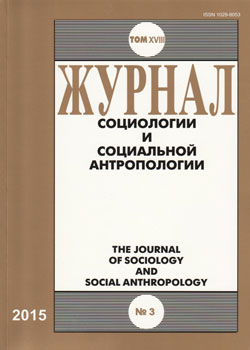The Identification Orientations of Central Russia’s Citizens: the Case of Kaluga Region
Keywords:
culture, cultural practices, cultural identity, Soviet and post-Soviet society, Kaluga Region
Abstract
The revaluation of the old and the emergence of new cultural „heroes“, symbols and rituals in the Russian society in the past two decades have made it necessary to correlate the value-regulatory system of the Soviet and post-Soviet periods. The older generation of Russians has to reinterpret the old symbols, rituals and cultural activities of a number of „heroes“ that leads to the fact that they are forced to re-socialize in modern society. The study examines the common characteristics of the cultural basis for the different generations, presupposing the continuity of cultural evaluations of various events, „heroes“ and symbols of the past and present. It is shown that „parents“ and „children“ are socializing in modern Russian society simultaneously: older participants learn themselves and teach „children“ new cultural practices at the same time. However, ambivalent evaluations of some „heroes“ make it impossible to clearly define the framework and cultural patterns of socialization for the younger generation. This creates a greater burden on the older generation of Russians, who have to endure a „cultural uncertainty“ of Russian society.
Published
2015-05-20
How to Cite
Popkov, V. (2015). The Identification Orientations of Central Russia’s Citizens: the Case of Kaluga Region . ZHURNAL SOTSIOLOGII I SOTSIALNOY ANTROPOLOGII (The Journal of Sociology and Social Anthropology), 18(3), 137–152. Retrieved from http://jourssa.ru/jourssa/article/view/404
Section
Identity Studies

